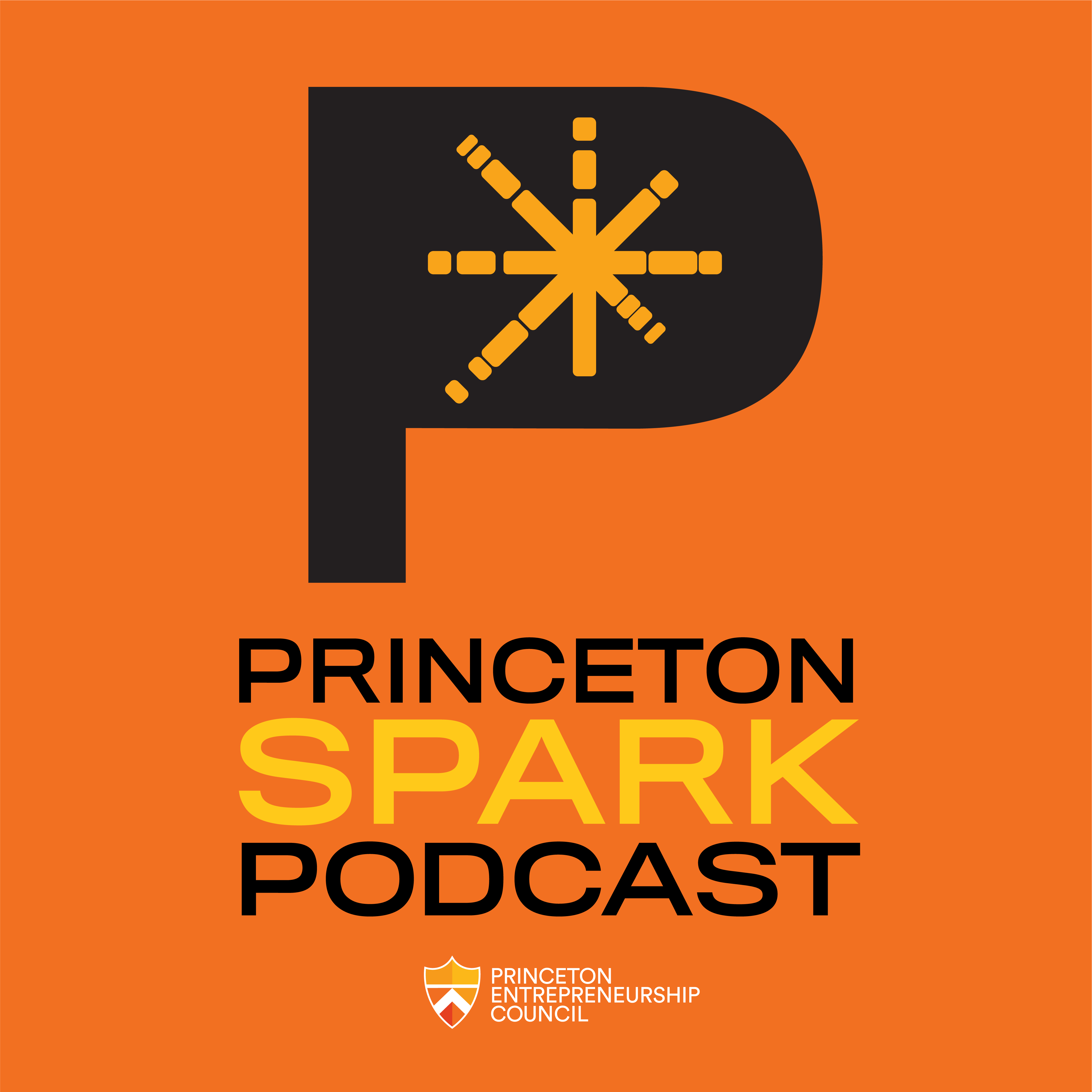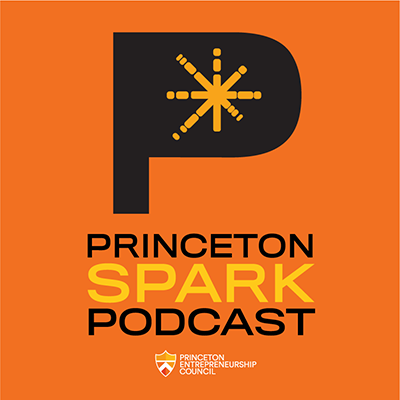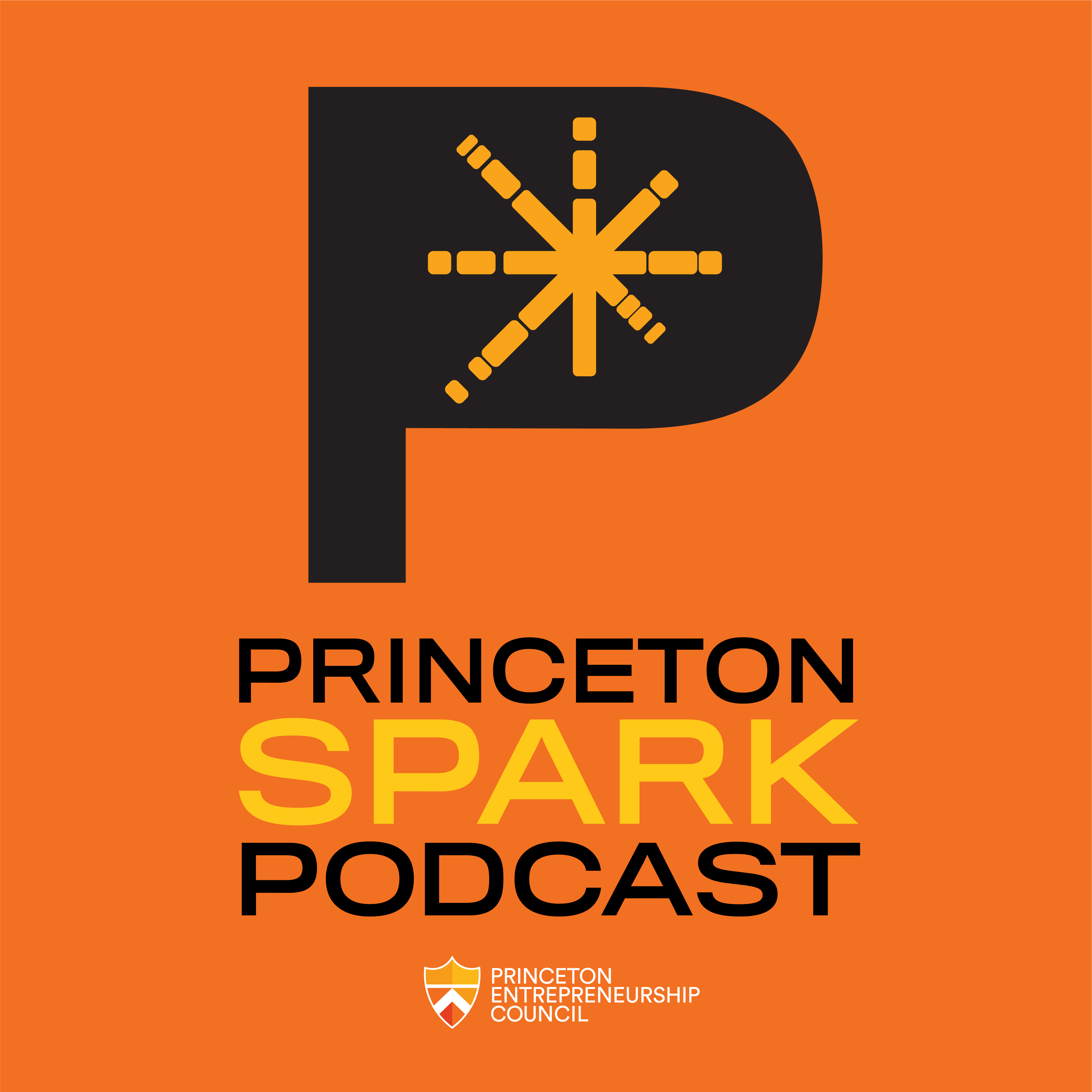Episode 001 - Taking Risks
Description
Taking Risks in Entrepreneurship, with Vaidhy Murti '15, Daphne Earp Hoppenot '10, Marcus Stroud '16 and Brandon Allen '16.
SHOW NOTES:
Try Vaidhy Murti's new app Wit at the Apple App Store or the Google Play Store. Friendsy does still exist! Check it out at friendsyapp.com.
Visit The Vendry on the web or check out their très chic Instagram account. As of this episode release, they are also hiring! Contact Daphne.
TXV Partners can be found on the web at txvpartners.com. For partnership and investment opportunities, reach out to connect@txvpartners.com. TechCrunch profiled Marcus and Brandon late in 2018.
CREDITS:
Produced by the Princeton Entrepreneurship Council. Music by Wright Seneres. Theme music by the Treadmills (Wright Seneres, electric guitar and electric bass; John Damond, Jr., drums). Engineered by Dan Kearns and Dan Quiyu at the Princeton Broadcast Center. Edited and mixed by Wright Seneres. Promotional readings by Megan Donahey '20.
TRANSCRIPT:
From the Princeton Entrepreneurship Council, this is the Princeton Spark. I’m Wright Seneres.
On your way up the main staircase at the Frist Campus Center at Princeton, if you look to the right as you go, there’s a marble bust of a man named Cyrus Fogg Brackett. Legend says his classroom was the first classroom anywhere with electric lights, which he rigged up himself, sometime in the 1870s.
Brackett was the first Joseph Henry Professor of Physics at Princeton, named for that large, looming figure in American science. Based on Joseph Henry’s work in electromagnetism at Princeton, the unit of electrical inductance is called the henry. From Princeton, Joseph Henry went on to be the first leader of the Smithsonian Institution, in 1848.
All of which goes to show that the entrepreneurial spark has always existed at Princeton, at least that long ago.
The various people that make up the Princeton entrepreneurial and innovation ecosystem have long been at work, taking risks to bring transformational ideas and companies to the world, in the Nation’s Service and the Service of Humanity. These are the stories of Entrepreneurship the Princeton Way. Hello and welcome to the Princeton Spark, a production of the Princeton Entrepreneurship Council. I’m your host, Wright Seneres, social media and marketing specialist at the Princeton Entrepreneurship Council.
At PEC, we support Princeton-connected startups and help to build the regional entrepreneurial ecosystem in New Jersey and beyond.
In this first season of the Princeton Spark, we’ll explore what it takes to succeed in entrepreneurship from experienced Princeton startup founders, investors, mentors, and more. We’ll look at their experiences in different industries, but we will likely see that these experiences...are not so different. Through these shared experiences, we will illuminate some aspects of the startup journey for the benefit of early-career and first-time founders.
No matter what kind of entrepreneurial pursuit you’re involved in, you will be taking risks. This is true whether you have a Princeton degree or not. Meet Vaidhy.
I'm Vaidhy Murti. When I was a sophomore, I wanted to build a better way to help college students on campus connect with each other. And I felt that when I was a freshman, the first few weeks like, it was this magical feeling where everybody was willing to, you know, reach out and connect and try to meet new people do new things, like you'd walk past someone on the sidewalk, they would, you know, look at you and smile and sort of look down at their phones. And I met a lot of like, my best friends in those first few weeks. And I think a lot of that was through serendipity and random chance. And I felt especially as I got older, as I you know moved on, like my next year in college, like those opportunities became like fewer and farther between. Everybody sort of was set in their social circles. And it felt as though everybody wanted to branch out and meet new people. So the core initial idea for Friendsy was, "Can we build a risk-free way to help college students, you know, branch out and meet the people around them?" And it was all started out of that.
And then Vaidhy got to work. In December of his sophomore year, he built out a website for other Princeton students to meet each other based on their interests, with the same kind of double-blind matchmaking concept that Tinder now dominates. With a couple friends, they rolled out a big marketing plan, and Vaidhy went to bed. With great anticipation for half the campus to sign up, Vaidhy woke up, opened his computer, and found one person signed up. One. But a couple of days later, they had a hundred users. After a week, a thousand. After some time, they rolled out to other schools, then came a problem.
What was happening was people would try to sign up for our app. And because the server was getting hammered, like every time, they would try to do anything, it would take, like 45 seconds to get a response. And that first impression is everything. So for a new user, when he walks into a new school, they download this app, and, you know, it's not working, they're going to immediately think, "Oh, like, what what junk, like, I'm not gonna ever use this again." So that was the first time where I was just like, "I don't know what to do, but we need to do something." And we try to, you know, talk to as many advisors as possible and try to get help from people who had a better understanding of how to set this up.
One of these advisors, had them over.
And what we ended up doing is we went over to his house one day. It was my CTO, another guy, and myself. And our goal was just to, you know, stay awake, until we were able to get our entire infrastructure off the single core machine into like the cloud, such that each part can be vertically and horizontally scalable, and to handle our traffic. And I remember, he told me, he was like, "Alright, well, your job is to buy as many energy drinks and coffee as possible. And so I went and I did this. And I remember, my mom asked me, she's like, "Where are you going?" And like, "Why do you have all this stuff?" "I don't know, Mom, like, we could be in for a long night."
That night turned into 50 hours straight. Five-zero. Certainly a risky move, health-wise. But they did get Friendsy on the cloud. Fortunately, this was not a regular occurrence. But the startup founder’s life has a sense of responsibility when weighing the risks.
I felt a sense of responsibility to everybody who is using our service to constantly improve it constantly try to make it better, I felt a sense of responsibility to my team, who believed in our vision and who believed in me to make sure that this can continue to be a possibility for them, that we could raise enough money that they would be able to get paid over the summer for their jobs, and then the bets that they were taking on me and this concept would also be good bets and pay off for them.
It crossed my mind the most once we graduated, and I was, you know, I had to make payroll every month, so people can pay their rent. And that's why it really, really, really hit me where if I cannot do this, many people will be negatively affected. You try, I feel like you try as a founder to not think about that as much as possible. Because you have to stay positive, you have to try your best to believe in what you're doing, and to try to not let those negative thoughts drag you down. But they're very, very real. And I feel like people don't often talk about that. When I was in school, it was somewhat easier. We had people I would say, taking risks by working with us over the summer, working with us during the school year. And you know, not going to that big Google job or that big Goldman job or, whatever it is they're interested in. It's like you're taking a bit like, there's, there's some opportunity cost there. But then, I also feel like the types of people we attracted, in terms of a team are not the types of people who necessarily wanted to go work at Google, or you know, work at one of these big companies anyway. There are people who were really, really excited by this idea.
And startup founders have their own personal risk calculations to make.
So you never really thought, “I'm gonna go get a job at Goldman or Deloitte or something.” was that ever part of your risk calculation? Like I could take this high paying job, I’m a CS major from Princeton...I could do that, or work on this, work on Friendsy or work on a startup. Was that ever part of your calculation?
It's tough. It was definitely a part of my calculation. It was definitely something that I had to consider because all of my friends were doing it. And that's like, I felt in college, that this was the standard thing that people would do, right? There's a lot of peer pressure, and even external pressures from other people who are like, “Oh, this is like a fun little side project, but you're gonna get a real job, right?” And gratefully, I would say, my mom and my sisters have always been immensely supportive of what I've wante










